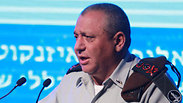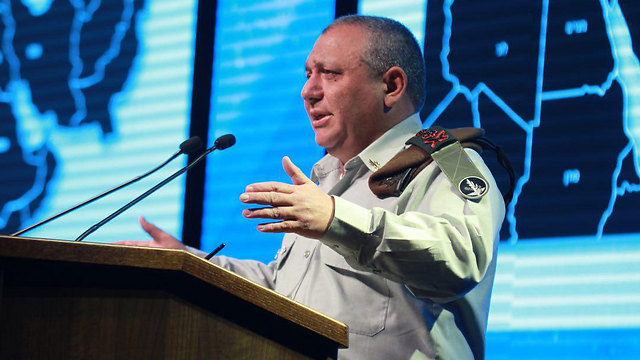
IDF Chief of Staff Gadi Eizenkot
צילום: מוטי קמחי
Eizenkot: Iran deal is an opportunity
At a convention on Monday the IDF chief of staff discusses a range of issues relating to Israel's security, including the potential increased threat from Islamic State, the wave of stabbing attacks and the Iran deal's risks and potentials.
IDF Chief of Staff Gadi Eizenkot on Monday touched on a range of security issues affecting Israel, during his speech at a convention taking place at the Institute for National Security Studies in Tel Aviv.

Eizenkot addressed the Iran deal, which led to the lifting of sanctions, saying: "The sanctions relief and the nuclear deal with Iran represent a strategic shift that the IDF will have to tackle over the next decade."

IDF Chief of Staff Gadi Eizenkot speaking at an INSS conference in Tel Aviv (Photo: Motti Kimchi) (צילום: מוטי קמחי)
He noted that the highest ranks in Israel, and in particular the Prime Minister's Office, are addressing only the risks bound up in the agreement.
"At the end of 2005 the main threat was Iran," Eizenkot continued. "The agreement is a significant change of course for Iran. There are many risks but also opportunities. We are re-evaluating this shift in the IDF's corridors of power.
"I would estimate that over the next five years Iran will make considerable efforts to fulfill its part and get the benefits from that," he said. "Iran is still near the top of our list in terms of the need to monitor them. Their vision of obtaining a nuclear weapon will continue insofar as Iran views itself as a regional power.
"Iran manages a war against Israel by means of proxies such as Hezbollah, which today represents the most serious threat to Israel.
"We also see (Iran's) attempt to influence Arab Israelis and those in the Gaza Strip, and the estimation is that as Iran's economic situation improves, over the next one-to-two years, it will divert considerably more resources into opposing Israel, via the Iranian military industry," Eizenkot continued.
"The Iranians have so far transfered around a billion dollars each year to Hezbollah and we estimate that this will increase. They also try to transfer tens of millions of dollars to Hamas each year."
Turning to the wider situation in the Middle East, Eizenkot estimated that the battle will encroach on Israel: "To my understanding, the Sunni-Shi'i conflict and the fighting in Syria will continue for many years. I think that the involvement of two powers is the key to reaching a settlement. The successes against Islamic State, in my view, raise the likelihood that we will see them turn their attention to us and the Jordanians.
"The IDF needs to be on standby for an escalation. We cannot rely on this slippery idea of deterrence. It's taken hold in Lebanon and it could change in any number of ways tomorrow," Eizenkot said.
"Whoever is standing in my place in a decade will, along with the army, be tackling greater challenges," he said in response to a question about whether the rules of the international game are changing, and whether following the rules is appropriate given that so many seem to be broken in the current age.
The ramifications of the nuclear agreement with Iran were also discussed at the conference, as well as the impact of the various actors in the Middle East – such as the increasing presence of Russia, the US's withdrawal, the IDF's recently-formulated strategic analysis and extremist Islam.
The chief of staff also touched on the wave of terror attacks and noted that the 101st stabbing attack in recent months occurred on Monday. "We had no warning of any of the 101 stabbing attacks in the wave of terror," he admitted. Looking forward, he emphasized that "terror in Judea and Samaria will continue for many years.
"The populations are mixed together, which creates a huge operational challenge," Eizenkot continued. "Despite the wave of terror we maintain that there is a separation between terror and the population and every day 120,000 Palestinians go to work in Israel and in Judea and Samaria, to support their families.
"I think that it's in Israel's interests to be restrained, as well as to maintain security cooperation with the Palestinians as a shared interest. You don't need to be a strategist or an intelligence officer in order to know that this will continue," Eizenkot added.
Last August, the chief of staff unveiled "The IDF Strategy," a document that detailed how he would operate in "routine, emergency and war" scenarios, what could be expected from him and what he expected from the political rank in order to be able to fulfill his role and bring results.
The document represented a milestone in which the army clarified, for the first time, what it requests are from the political echelon in order to function effectively.
"The IDF Strategy" also clarified that the political rank could present the army with two types of request in the event of a war against a non-state enemy, such as Hamas, Hezbollah or Islamic State: either full military engagement or restricted and localized strikes against the enemy. During Operation Protective Edge, for example, the political echelon requested limited strikes against the enemy and not to overwhelm them.










